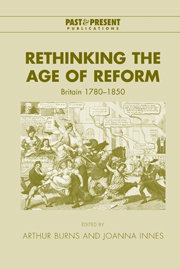Book contents
- Frontmatter
- Contents
- Notes on contributors
- Preface
- List of abbreviations
- 1 Introduction
- 2 ‘Reform’ in English public life: the fortunes of a word
- 3 Parliament, the state, and ‘Old Corruption’: conceptualizing reform, c. 1790–1832
- 4 ‘Old wine in new bottles’: the concept and practice of law reform, c. 1780–1830
- 5 English ‘church reform’ revisited, 1780–1840
- 6 Medicine in the age of reform
- 7 British antislavery reassessed
- 8 ‘The age of physiological reformers’: rethinking gender and domesticity in the age of reform
- 9 Reforming the aristocracy: opera and elite culture, 1780–1860
- 10 Reform on the London stage
- 11 Reforming culture: national art institutions in the age of reform
- 12 Irish reform between the 1798 Rebellion and the Great Famine
- 13 Empire and parliamentary reform: the 1832 Reform Act revisited
- 14 Reforms, movements for reform, and possibilities of reform: comparing Britain and continental Europe
- Index
- Past and Present Publications
8 - ‘The age of physiological reformers’: rethinking gender and domesticity in the age of reform
Published online by Cambridge University Press: 15 December 2009
- Frontmatter
- Contents
- Notes on contributors
- Preface
- List of abbreviations
- 1 Introduction
- 2 ‘Reform’ in English public life: the fortunes of a word
- 3 Parliament, the state, and ‘Old Corruption’: conceptualizing reform, c. 1790–1832
- 4 ‘Old wine in new bottles’: the concept and practice of law reform, c. 1780–1830
- 5 English ‘church reform’ revisited, 1780–1840
- 6 Medicine in the age of reform
- 7 British antislavery reassessed
- 8 ‘The age of physiological reformers’: rethinking gender and domesticity in the age of reform
- 9 Reforming the aristocracy: opera and elite culture, 1780–1860
- 10 Reform on the London stage
- 11 Reforming culture: national art institutions in the age of reform
- 12 Irish reform between the 1798 Rebellion and the Great Famine
- 13 Empire and parliamentary reform: the 1832 Reform Act revisited
- 14 Reforms, movements for reform, and possibilities of reform: comparing Britain and continental Europe
- Index
- Past and Present Publications
Summary
In 1852 the Westminster Review, musing upon the widespread popularity of alternative medicine, declared it to be ‘pre-eminently the age of physiological reformers’. Certainly for many early Victorian radicals, the concept of reform extended far beyond demands for political, economic, and social changes; it encompassed a desire to democratize the very care and feeding of the body. As J. F. C. Harrison observed, a striking number of Owenites and Chartists rejected the heroic, interventionist medical practices of the day, and turned to alternative health therapies; so too did the families of numerous middle-class reformers, including the Sturges, McLarens, Ashursts, and Stansfelds. This is not to say, of course, that there is a necessary causal link between radical politics and popular medicine. However, the frequency of these connections raises important questions, not least for assessments of women's political activism and the construction of the home within radical discourse.
By focusing upon the importance of the domestic site and female activism within five areas of health reform (namely, vegetarianism, homoeopathy, hydropathy, hygeism, and medical botany) this chapter seeks to problematize the assumption that women became alienated from reforming politics during the 1840s as its structures and organization became increasingly formalized and bureaucratized. In so doing, it aims also to further debate concerning the nature of female political consciousness. The restricted nature of female political identities has been much discussed, such identities drawing so frequently upon socially constructed norms of wife and motherhood.
- Type
- Chapter
- Information
- Rethinking the Age of ReformBritain 1780–1850, pp. 200 - 219Publisher: Cambridge University PressPrint publication year: 2003
- 1
- Cited by



